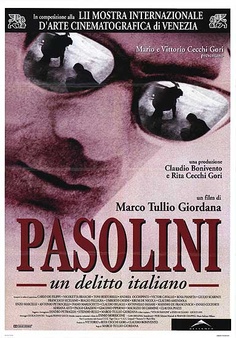| Who Killed Pasolini? | |
|---|---|
 Theatrical release poster | |
| Directed by | Marco Tullio Giordana |
| Written by | Enzo Siciliano (novel) Marco Tullio Giordana |
| Produced by | Vittorio Cecchi Gori Rita Rusic |
| Starring | Claudio Amendola Carlo De Filippi Nicoletta Braschi |
| Cinematography | Franco Lecca |
| Edited by | Cecilia Zanuso |
| Music by | Ennio Morricone |
| Distributed by | Variety Distribution |
Release date |
|
Running time | 100 minutes |
| Countries | Italy France |
| Language | Italian |
Pasolini, un delitto italiano (Pasolini, an Italian Crime), internationally released as Who Killed Pasolini?, is a 1995 Italian crime-drama film co-written and directed by Marco Tullio Giordana. It was released on 3 July 1996. It depicts the trial against Pino Pelosi, who was charged with the murder of artist and filmmaker Pier Paolo Pasolini. [1]
Contents
The film entered the competition at the 52nd Venice International Film Festival, in which Giordana won the President of the Italian Senate's gold medal. [2] The film also won the David di Donatello for best editing. [2]